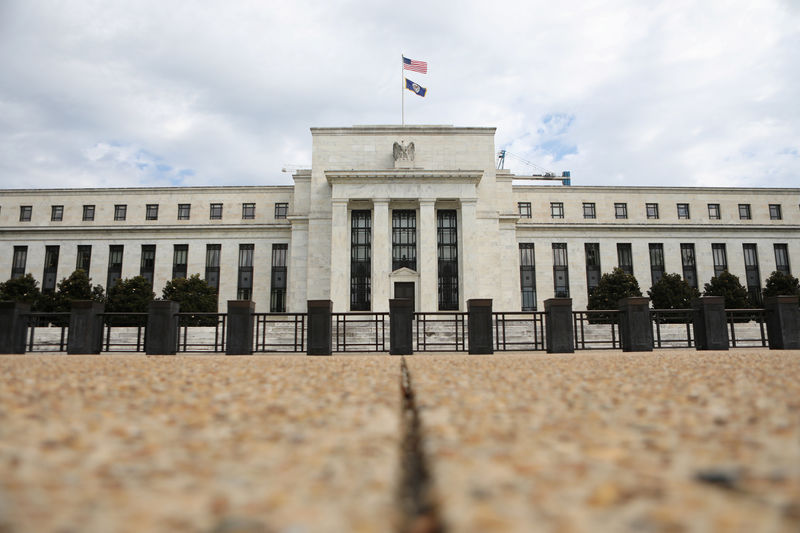Street Calls of the Week
By Geoffrey Smith
Investing.com -- The Federal Reserve's regular policy meeting ends, with Jerome Powell likely to present a more gloomy outlook than before when he holds his press conference. The CEOs of four Big Tech companies travel to Washington to tell lawmakers that they're not monopolists. Stocks are set to open higher after some reassuringly strong earnings late on Tuesday (notably from chipmaker AMD), the dollar is still under pressure, and oil prices bounce back after the American Petroleum Institute indicates crude demand stayed buoyant last week. Here's what you need to know in financial markets on Wednesday, July 29th.
1. Powell to strike cautious note after Fed meeting
The Federal Reserve will conclude a two-day meeting of its policy-making Federal Open Markets Committee. The committee’s decisions are due at 2 PM ET (1400 GMT), and Chairman Jerome Powell’s press conference will follow half an hour later.
No immediate changes to monetary policy are expected, although the Fed did announce on Tuesday that it will extend seven of its nine emergency lending facilities for another three months, creating a safety net that may be needed if the global wave of Covid-19 infections continues to rise.
Given the generally downbeat tone of comments from Fed officials before the blackout, there is a chance that the central bank’s guidance will take on a more ‘dovish’ note, with increasingly heavy hints of future easing if necessary. Expectations of as much have been a large factor behind the recent surge in gold and Treasury bond prices.
The dollar index hit a new 22-month low.
2. Monopolists? Us?
Representatives of four of the U.S.’s biggest tech companies will appear before the House of Representatives’ Antitrust Sub-Committee on Capitol Hill, in an effort to persuade lawmakers that they aren’t concentrating excessive wealth and power in the U.S.
The committee will hear evidence from Facebook’s Mark Zuckerberg, Amazon’s Jeff Bezos, Apple (NASDAQ:AAPL) CEO Tim Cook and Alphabet (NASDAQ:GOOGL) CEO Sundar Pichai.
In prepared remarks released ahead of the hearing, the four all stressed their ability to meet demands for new goods and services and strenuously downplayed suggestions that their success was due to monopoly power.
The four companies combined, along with Microsoft (NASDAQ:MSFT), now represent 22% of the S&P 500 market capitalization, a higher degree of concentration than anything seen in the last 20 years.
3. Stocks set to open higher; AMD's strong quarter supports; Industrial heavyweights to report
U.S. stock markets are set to open mostly higher ahead of what could be a bumpy session for megacap stocks, depending on how the Congressional hearing goes.
By 6:30 AM ET (1030 GMT), the Dow futures contract was up 25 points or 0.1%, while the US 500 Futures contract was up 0.2% and the Nasdaq 100 futures contract was up 0.5%
There’ll be earnings updates before the bell from Boeing, Shopify and automotive mid-cap General Motors, among others. Top billing after the close goes to PayPal and Qualcomm. The latter will have to live up a better-than-expected performance from Advanced Micro Devices (NASDAQ:AMD), which is indicated to open 11% higher after a strong quarterly report late on Tuesday.
4. Euro banks ravaged by Covid-19 provisions
Europe's banks followed the pattern of U.S. ones in the second quarter. Those with relatively big investment banking arms, such as Deutsche Bank (DE:DBKGn) and Barclays (LON:BARC), were able to offset heavy provisions for credit losses with windfall gains in the stock and, especially, the bond and currency markets.
Main street lenders fared worse. Spanish-based Santander (MC:SAN) took a $14 billion charge against the value of its assets, mostly against its struggling U.K. subsidiary. As with Dutch bank ING on Tuesday, it took the hit as a non-cash charge against goodwill, thus sparing its sensitive capital ratio. The European Central Bank had said on Tuesday it would give banks until at least the end of 2022 to get over the worst ravages of Covid-19 on their balance sheet but "recommended" that they pay no dividends this year.
Unicredit (MI:CRDI), which had big dividend plans at the start of the year, indicated on Wednesday it will comply with the recommendation.
5. Oil stabilizes after API data
Oil prices have stabilized after the American Petroleum Institute’s weekly estimate of U.S. crude inventories showed a much bigger draw than expected. The API estimated a draw of 6.83 million barrels, much bigger than the 1.2 million draw forecast.
However, stocks of both gasoline and distillates both posted unexpected increases. The official government data are due as usual at 10:30 AM ET (1430 GMT).
U.S. crude futures were up 1.0% at $41.45 a barrel, while the international benchmark Brent was up 1.2% at $44.11 a barrel.
Jitters about the strength of both U.S. and global demand are being made worse by the awareness that OPEC and its allies are about to release 2 million barrels a day more crude into the world market from Aug. 1. Analysts at Rystad Energy say that may be enough to tip the market back into surplus.
